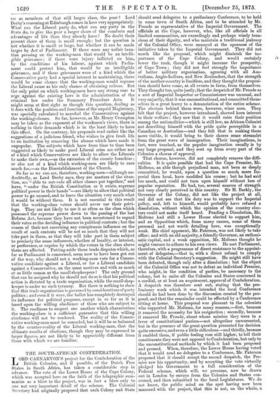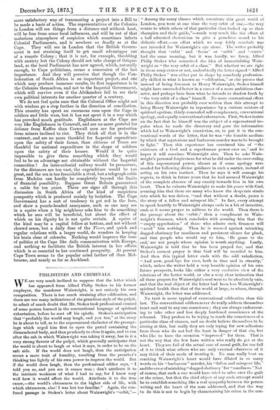THE SOUTH-AFRICAN CONFEDERATION.
TORD CARNARVON'S project for the Confederation of the J British Colonies, and if possible, of the Dutch Free States in South Africa, has taken a considerable step in advance. The vote of the Lower House of the Cape Colony, which was accepted here on the faith of the telegraphic sum- maries as a blow to the project, was in fact a blow only to one not very important detail of the scheme. The Colonial Secretary had originally proposed that each Colony and State
should send delegates to a preliminary Conference, to be held in some town of South Africa, and to be attended by Mr. Fronde as representative of the Imperial Government. The officials at the Cape, however, who, like all officials in all limited communities, are exceedingly and perhaps wisely tena- cious of their dignity, and who maintain a traditional jealousy of the Colonial Office, were annoyed at the openness of the initiative taken by the Imperial Government. They did not much like the proposal, which might diminish the im- portance of the Cape Colony, and would certainly lower the rank, though it might increase the prosperity, of Cape Town ; they did not feel strongly the importance of better military organisation, agreeing with all Aus- tralians, Anglo-Indians, and New Zealanders, that the strength of the mother-country is limitless, and they thought the proposi- tion should have come, at all events in form, from themselves. They thought too, quite justly, that the despatch of Mr. Fronde as a sort of Imperial Inspector or Commissioner was unusual, and very unjustly, that it was unconstitutional, and committed them- selves in a great hurry to a denunciation of the entire scheme. The electors behind them were, however, wiser men. They felt that the project, however introduced, showed keen interest in their welfare ; they saw that it would raise their position among the nationalities—which is still low, an African Colonist not describing himself with the pride quite perceptible in a Canadian or Australian—and they felt that in making them more visible, it would bring to their shores some streamlet from the great wave of immigration. Their imaginations, in fact, were touched, as the popular imagination usually is by any large proposal, and they sent up from every part of the Colonies a chorus of approval.
That chorus, however, did not completely remove the diffi- culties. It is quite possible that had the Cape Premier, Mr. Molteno, an able though prejudiced man, not been so deeply committed, he would, upon a question so much more Im- perial than local, have modified his course ; but he had said too much, and could not turn upon himself without loss of popular reputation. He had, too, several sources of strength not very clearly perceived in this country. Sir H. Barkly, the Governor of the Colony, did not like the project at all, and did not see that his duty was to support the Imperial policy, and, left to himself, would probably have refused a dissolution, without which the opinion of the country elec- tors could not make itself heard. Pending a Dissolution, Mr. Molteno had still a Lower House elected to support him, and an Opposition which, from many causes, some of them personal and not worth detailing here, was exceptionally weak. His chief opponent, Mr. Paterson, was not likely to take office; and with an old majority, a friendly Governor, an enthusi- astic capital, and a weak opposition, Mr. Molteno thought he might venture to adhere to his own views. He met Parliament, therefore, with a programme of direct resistance to the appoint- ment of delegates,—that is, with a direct refusal to comply with the Colonial Secretary's suggestion. He might still have been defeated, though only after a dissolution ; but the object of the Colonial Office was not to defeat an individual Premier, who might, in the condition of parties, be necessary to the colony, but to unite all the Colonies and States concerned in a cordial, or at least an acquiescent, approval of Confederation. A despatch was therefore sent out, stating that the pre- liminary work which it was intended the local Conference should do had been done by the discussion created by the pro- posal, and that the remainder could be effected by a Conference sitting at home. This proposal was pleasant to the colonists who supported Mr. Molteno, for many reasons,—first, because it removed the necessity for his resignation ; secondly, because it removed Mr. Froude, about whose mission they were in a fever of constitutional purism—not altogether unwarranted, but in the presence of the great question presented for decision quite excessive, and even a little ridiculous—and thirdly, because it enabled them, if public feeling rose still higher, to tell their constituents they were not opposed to Confederation, but only to the unconstitutional methods by which it had been proposed and pressed. When, therefore, the Lower House having voted that it would send no delegates to a Conference, Mr. Paterson proposed that it should accept the second despatch, the Pre- mier saw his opportunity, and by accepting the vote virtually pledged his Government to a full consideration of the Federal scheme, which will, we presume, now be drawn out in London by envoys from the Colonies and States con- cerned, and then submitted to the local Legislatures. We do not know, the public mind on the spot having now been manured with the project, that this is not, on the whole, a more satisfactory way of transmuting a project into a Bill to be made a basis of action. The representatives of the Colonies in London will see things from a distance and without heat, will be free from some local influences, and will be out of that malarions atmosphere of suspicion which sometimes infects Colonial Parliaments, and is nowhere so deadly as at the Cape. They will see in London that the British Govern- ment is not straining itself to get small advantages out of a remote Colony • that it is not, for example, throbbing with anxiety lest the Colony should not take charge of Griqua- land, as the local Parliament has now agreed, which, naturally enough, to Cape politicians, seems a concession of the last importance. And they will perceive that though the Con- federation of South Africa is an important project, and one which may produce immense results, its first importance is to the Colonies themselves, and not to the Imperial Government, which will survive even if the Afrikanders fail to see their own political interests for another quarter of a century.
We do not feel quite sure that the Colonial Office might not with wisdom go a step further in the direction of conciliation. This country has spent an enormous sum upon the Cape in soldiers and little wars, but it has not spent it in a way which has provoked much gratitude. Englishmen at the Cape are very like Englishmen in Cornwall, and are no more grateful for defence from Kaffirs than Cornwall men are for protection from miners inclined to riot. They think all that is in the contract, and are no more thankful for Imperial expenditure upon the safety of their farms, than citizens of Truro are thankful for national expenditure in the shape of soldiers upon the safety of their houses. Would it be quite impossible to give them something which they would feel to be an advantage not obtainable without the Imperial connection ? An inter-colonial railway would be premature, for the distances are too vast, the expenditure would be too great, and the sea is too formidable a rival, but a telegraph cable from Madeira can hardly be completely beyond the limits of financial possibility. Suppose Great Britain guaranteed a cable for ten years. There are signs all through this discussion in South Africa of the kind of suspicious pomposity which is produced mainly by isolation. The Cape Government has a sort of tendency to get red in the face, and show a puzzle-headed annoyance, such as one may see in a squire when a big neighbour asks him to do something which he sees will be beneficial, but about the effect of which on his dignity he is not quite certain. A squire of the kind may be a capital fellow at bottom, and not without shrewd sense, but a daily dose of the Times, and quick and regular relations with a larger world, do wonders in keeping his brain clear of cobwebs. Nothing would improve the tone of politics at the Cape like daily communication with Europe, and nothing so facilitate the British interest in her affairs which is so essential to her continued prosperity. At present Cape Town seems to the popular mind farther off than Mel- bourne, and nearly as far as Auckland.



































 Previous page
Previous page